A version of this story appeared in the March 3 edition of CNN’s Royal News, a weekly dispatch bringing you the inside track on Britain’s royal family. Sign up here.
Royals speak through actions more than words, which often leaves royal commentators reading into what they do without the benefit of an explanation. This week, it came down to a handshake.
King Charles III extended a warm welcome to President of the European Commission Ursula von der Leyen at Windsor on Monday. The pair chatted over a cup of tea and, according to a royal source, the meeting was an opportunity for the British sovereign to discuss the war in Ukraine and climate change with the visiting dignitary. Looking at the photograph of the moment, you may not see anything controversial, but it sparked this response from former BBC Royal Correspondent Peter Hunt, who tweeted:
“This is a very serious error of judgement by King Charles and his advisors. He’s abandoned his unifying role and entered the political fray, in a foolish bid to be seen as statesmanlike. History won’t be kind. Someone’s head will roll.”
For context, Von der Leyen is not a head of state. Her counterpart in the UK is Prime Minister Rishi Sunak. An audience with the King was therefore a special privilege and falls under the category of “rolling out the red carpet” – which the British government often leans on when VIPs fly into town.
But it wasn’t the meeting itself that drew criticism, it was the timing of the diplomatic gesture.
Von der Leyen had indeed come to the UK to meet Sunak so the pair could finalize a new UK deal with the European Union on post-Brexit trade arrangements in Northern Ireland. With its history of sectarianism and violence, the province is a deeply sensitive political issue, as is Brexit.
From Sunak’s point of view, the key challenge was winning support for a new protocol from two key groups: the Democratic Unionist Party (DUP), which wants Northern Ireland to remain a full part of the UK, and the European Research Group (ERG), which is made up of pro-Brexit Conservative lawmakers. Both these groups have an interest in limiting Europe’s jurisdiction in Northern Ireland. They are also both firmly pro-monarchy.
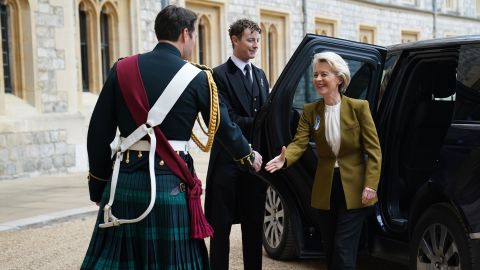
When it emerged that the King would hold an audience with Von der Leyen, critics questioned both the government and the palace’s judgment, their argument being that his involvement could be interpreted as an implied endorsement of the political deal when, constitutionally, he’s supposed to remain above politics. Many questioned whether Sunak had used the monarch to make his deal more palatable to the DUP and ERG.
If that was the plan, it backfired.
Former DUP leader Arlene Foster tweeted her disbelief that “No10 would ask HM the King to become involved,” before labeling the move “crass” and predicting it would “go down very badly in NI (Northern Ireland).”
She added: “We must remember this is not the King’s decision but the Government who it appears are tone deaf.”
“I think the sovereign should only be involved when things have been completed and accepted,” Jacob Rees-Mogg, of the ERG, told GB News. “The King gives assent to acts of parliament when parliament has agreed, he doesn’t express his view on acts of parliament when they are going through the process. I think the same applies, that His Majesty should not be involved until there is full support for this agreement.”
The palace made it clear it didn’t arrange the meeting. A spokesperson told CNN: “The King is pleased to meet any world leader if they are visiting Britain and it is the Government’s advice that he should do so.”
For the government, UK Foreign Secretary James Cleverly told LBC radio: “It was our invitation to Ursula von der Leyen to come to the UK to finalize this deal with the prime minister. So of course, that was a conversation we had with the palace.” He added that, “the final decision, of course, on the availability of His Majesty is with the palace.”
It’s unimaginable, however, that the King would refuse a request from the government without good reason.
As the week draws to a close, the landmark deal agreed by Sunak and Von der Leyen appears to be going down better than expected and didn’t trigger a political firestorm as some had feared. It was perhaps a close call for King Charles, who has been accused of political interference in the past. If it had blown up, it would have reflected on him, as it would have on everyone else in the room that day.
Next time he may be less fortunate. There are few options available to him if he wants to avoid a meeting with someone who compromises his independence. Theoretically, he could say no to Downing Street’s request, but that would create its own political backlash. Instead, he must rely on the prime minister of the day to have his back and keep him away from any potentially embarrassing situations.
In the royal diary
Speaking of European dignitaries … On Friday, Buckingham Palace made the long-awaited announcement of Charles and Camilla’s first joint state visit since he ascended the throne.
The new monarch and his wife will visit France and Germany later this month for a six-day trip, touring some famous landmarks and attending state banquets hosted by French President Emmanuel Macron and German President Frank-Walter Steinmeier.
A long list of engagements will await in Paris, where Charles and Camilla will arrive on March 26. The King will address lawmakers at the French Senate, open a new exhibition at the Musée d’Orsay, and join the Macrons, along with Camilla, at a ceremony of remembrance at the Arc de Triomphe.
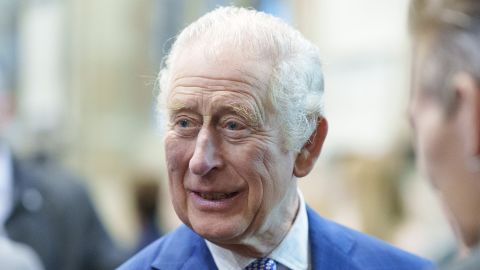
Charles will also “witness first-hand the devastation caused by last summer’s wildfires on the outskirts of Bordeaux,” the palace said, continuing the King’s long-standing efforts to raise awareness of the climate crisis.
On March 29, the royals will arrive in Germany, where they’ll meet Ukrainian refugees and representatives from a joint German-British military unit.
The choice of a new monarch’s first official overseas trip is a significant one, and Charles has opted to spend time with two close European partners of the UK. It marks the continued significance of Europe as an economic and political partner to Britain, despite the complicated post-Brexit relationship that London will hope was at least partially mended this week.
A senior palace spokesperson said the trips are a “chance to look forwards and show the many ways our countries are working in partnership, whether that be to tackle climate change; respond to the conflict in Ukraine; seize trade and investment opportunities or share the best of our arts and culture.”
70 years ago, Queen Elizabeth II went on a tour of Commonwealth countries as her first overseas engagement, starting with a stop in Bermuda.
Don’t miss
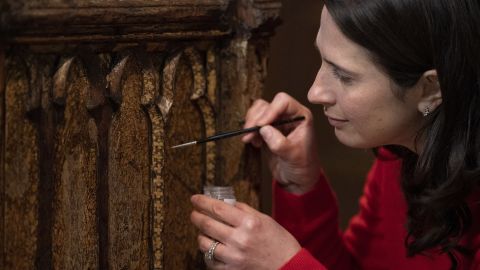
A 700-year-old chair is getting a facelift for the coronation.
A conservator at London’s Westminster Abbey is carrying out meticulous restoration work on a fragile 700-year-old chair to ensure King Charles III can sit on it at his coronation in May. The ancient throne, known as the Coronation Chair, has been the centerpiece of English coronations for centuries, including those of Henry VIII, Charles I, Queen Victoria and the late Queen Elizabeth II. Westminster Abbey – where the ceremony will take place – describes the chair as “one of the most precious and famous pieces of furniture in the world” and says it is in “remarkable condition” given its age. Nevertheless, it must still undergo some conservation work ahead of the ceremony to crown the King and Queen Consort on May 6. Get the full story here.
Royal tea break
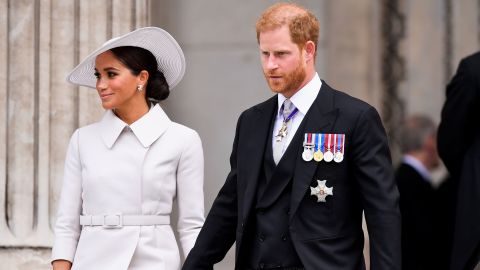
It’s a story that’s been bubbling all week since British newspaper The Sun reported that the Sussexes were being evicted from their UK base of Frogmore Cottage in Windsor by the King. The decision was apparently made after Prince Harry published his memoir, “Spare,” in January. According to the newspaper, Prince Andrew is being offered the use of the cottage instead. He currently lives nearby at the Royal Lodge. Frogmore was given to the couple as a grace-and-favor home, meaning the late Queen Elizabeth II allowed the Sussexes to use it in the long term. However, King Charles appears to feel differently. The couple’s spokesperson confirmed to CNN that “the Duke and Duchess of Sussex have been requested to vacate their residence at Frogmore Cottage.” Read the full story here.
What else is happening?
William and Kate get into gardening.
The Prince and Princess of Wales launched a new collaboration with Life at No.27, a social enterprise that creates therapy allotments to provide mental health support for communities in south Wales. The announcement was made at Brynawel Rehabilitation Center, near the town of Pontyclun, where the first garden will be developed. Annabelle Padwick, founder of Life at No.27, said in a statement that she has “seen first-hand how working with therapy gardens can dramatically improve self-belief and your own mental health” – causes that Kate has long championed. Padwick praised how the “unique” treatment allows those suffering from mental ill health to “process and explore difficult experiences with trained therapists whilst at the same time learning new skills.”
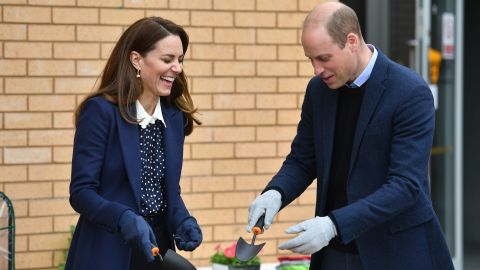
Harry and Meghan’s foundation honors civil rights activist.
The National Association for the Advancement of Colored People (NAACP) and the Archewell Foundation announced the 2023 recipient of the Digital Civil Rights Award on Monday. The annual award, launched last year, recognizes long-term contributors to the digital rights space whose work promotes equity. This year’s winner is Nabiha Syed, a lawyer and CEO of The Markup, a media outlet which investigates how powerful institutions use technology to change society. “Technology is the architecture of our reality – but unfortunately, that architecture can perpetuate inequality and injustice. Our job now is to challenge technology to serve us all, not just those who hold power and privilege,” Syed said in a statement after receiving the award. The Sussexes praised Syed’s work, which “empower(s) all of us to reclaim some of our most basic freedoms: truth, safety, and choice.”
Did you know?
William has become royal patron of the Wales Air Ambulance charity – his first Welsh patronage since he received the title “Prince of Wales.” The patronage was announced during William and Kate’s visit to the charity’s headquarters on Tuesday, where they met emergency workers and volunteers. William, who previously worked as a pilot for the East Anglian Air Ambulance, “has first-hand experience of working in the unique and often challenging air ambulance environment,” according to Sue Barnes, chief executive of the Welsh charity.
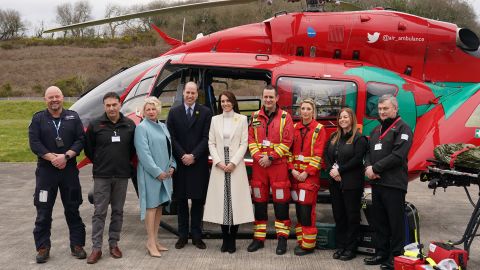
The British monarch sent a message of condolence to the President of Greece following Tuesday’s deadly train crash, which killed more than 50 people. King Charles said he and wife Camilla have been “most shocked and profoundly saddened by the news of the dreadful accident” and wanted to “express our deepest possible condolences.”
King Charles' meeting with EU chief is being criticized. Here's why - CNN
Read More

No comments:
Post a Comment